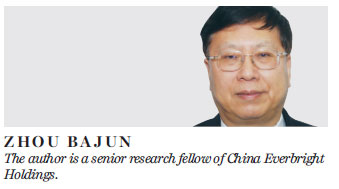Hong Kong must push ahead with economic development
Updated: 2015-09-23 09:14
By Zhou Bajun(HK Edition)
|
|||||||||
On the morning of Sept 27, 2014, before "Occupy Central" began the next day, I was traveling along the Island Eastern Corridor expressway to Cityplaza in Taikoo Shing. As I looked at Victoria Harbour I saw a few white sailboats gliding in the "Fragrant Harbour" under the blue sky. My mind inadvertently shifted to the Central Government Complex a couple of kilometers to the west. There, a group of college and middle school students were holding a political protest. I told myself that this city was no doubt feeling a little restless but was in no danger of general unrest.
This was a thought that felt like an instinctive reaction. But it was really based on rational analysis of the relations between economic, political and social factors in Hong Kong.
I believe the reason why "Occupy" actually happened - why most of the participants were young people and why a couple of student groups soon took over the leadership of the illegal movement - was because Hong Kong's social problems and political disputes were beginning to get mixed up. At the heart of it all was the fact that Hong Kong's economic transformation had got stuck.
The younger generation's desire for greater democracy did not emerge just last year. They would not have turned out by the thousands to join the protest outside the Central Government Complex had Hong Kong's economic transformation proceeded smoothly and had their hopes of becoming homeowners and attaining career promotions not been so remote.
On the other hand, the fact that "Occupy" broke out outside the Central Government Complex instead of the financial district about a kilometer to the west as originally planned, was also tied up with Hong Kong's economy.
Hong Kong is, of course, an international financial center. This is why the initiators of "Occupy" believed they could force the central government to give in if they threatened to weaken Hong Kong's status as an international financial center by paralyzing its financial district in Central. However, as soon as they realized the central government would not give in to their threats they changed their minds. They then blocked the Central Government Complex in Admiralty in the beginning - sparing Central completely throughout the 79-day illegal campaign. Apparently, they could not risk jeopardizing the interests of so many foreign and local businesses by blocking traffic in Central.
Hong Kong, despite some unimpressive results in economic transformation, has achieved better growth than many other developed economies. Although its income gap has been expanding, the standard of living of most local families has been improving as well. Soaring property prices no doubt make it ever harder for young people to buy homes - but also add value to homeowners' portfolios. As such, the number of protesters managed to reach the tens of thousands but the great majority of local residents chose to be spectators rather than joining the illegal acts. As "Occupy" persisted, its threat to Hong Kong's economy became more ominous. Consequently, more people spoke out against it. With its popularity waning, the organizers of "Occupy" had no choice but to call it off before it could lead to widespread violence.
It has been almost a year since "Occupy" began. Today, Hong Kong's social contradictions remain as confused as they are frustrating. In theory there are three solutions: One is to start trying to resolve the political disputes; another is to begin trying to solve Hong Kong's social problems; and yet another is to do both at the same time.
The SAR government does not have what it takes to do both at the same time. Of the other two options, it is obviously more difficult to tackle political rather than social issues. Since "Occupy" ended and the government's constitutional reform bill was blocked by the opposition minority in the Legislative Council, a number of "moderate pan-democrats" have left the Democratic Party and the Civic Party. They have formed new organizations to explore a third path in Hong Kong politics. This is a positive development as far as resolving Hong Kong's political disputes is concerned. But we cannot ignore the reality that the two political camps cannot be reconciled in the foreseeable future. Therefore, the SAR government made the wise decision of refocusing on economic development and improving people's well-being in the "post-electoral reform era". This is the only way to alleviate social conflict.
Economic development involves two main areas - maintaining desirable rates of growth, employment and low inflation, while advancing the structural transformation of industries. Together, the two approaches should help ease social conflicts. It should prevent further entanglement of social and political issues and calm political tensions by solving social conflicts. Hong Kong's economic prospects for the coming months give us no reason to be optimistic. However, the SAR government has no choice but to face the challenges head on.

(HK Edition 09/23/2015 page9)